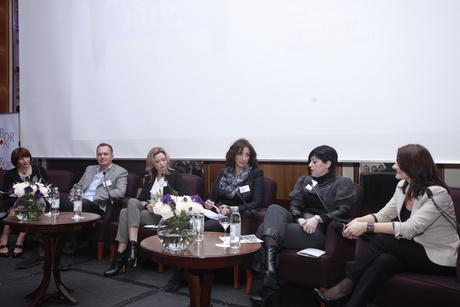I was delighted and humbled when Ivana Matic, Founder of Women in Adria invited me to be a keynote speaker at a conference to recognise the 300 most powerful women in Croatia. The event, sponsored by Lider magazine and the European Bank for Reconstruction and Development (EBRD) focused on both corporate and entrepreneurial women. It was my first trip to Croatia and not only are the women in Croatia powerful, they are also extremely glamorous!
I observed a general sense of well being. When I polled the conference to ask if any women had experienced any real difficulties associated with gender in their careers, only one woman put up her hand. A large number had experienced no difficulties at all! I wondered if my contribution might be redundant!
5 things ALL women can do to advance their career
This was the theme of my opening words. There are probably actually about 30 (I lied) but I only had 20 minutes so I grouped them together. As you know I like to focus on the talent pipeline as well as women headed for the top. Here’s what I covered:
- Don’t expect anyone to take care of you
- Raise your visibility
- Network strategically
- Negotiate
- Plan ahead
I hadn’t been sure if my presence was necessary, but it was great when at the end of the conference, women came up to me and told me they had networked with 6 women they didn’t know and they were going to create LinkedIn profiles!
The winner was…
Ljerka Puljic, EVP Agrokor, took the top spot in the league table of 300 powerful women in the region. In a persuasive interview, she emphasized the need for women to make tough decisions, but also suggested that finding a balance between private and professional life was not necessarily the same for everyone and a matter of individual choice.
49th place
Croatia is a relatively young emerging market, yet still comes in at number 49 in the World Economic Forum Gender Gap Report, higher than France (which has slid to 57th place) and ahead of 75 other countries. So there is every reason to feel that progress is being made. The number of women represented on management boards is 19% and 20% on supervisory boards (higher than the European average) and women have a 23-29% presence in management roles depending on the number of layers in the organisation. The less good news is that although 61% of Croatian graduates are women, they make up 45.6% of workforce, suggesting some mid-level churn. There is also a 10% -19% wage gap reported, and a significantly high level of responsibility assumed for domestic chores and childcare.
Less complacent
Gordana Frgacic, author of a book on the gender pay gap in Croatia is more bullish in her outlook, “One of the greatest challenges in Croatia is to create an awareness amongst women that a pay differential based on gender exists. Women often don’t believe it when I tell them that they are probably paid 10-19% less than their male colleagues. We are still struggling to deal with deep rooted stereo-typing and the management of expectations associated with gender in Croatia. There is still a lot of work to be done.“
At a meeting the following day, Visnja Ljubicic, the Ombudsperson for Gender Equality in Croatia, confirmed that there is no place for complacency, “….although much progress is being made in Croatia, discrimination still exists. An increasing number of cases of sexual discrimination and harassment are reported each year across all sectors, including international industry. Women also make up a large percentage of the numbers unemployed and are very often the first to lose their jobs.”
Practical steps
Ivana Matic added, “If we keep talking about prejudices and obstacles instead of talking about what women can do themselves for their careers, we won’t go very far. Let’s shift our focus from the obstacles women face, to the practical things we can work on to advance our careers, such as networking, negotiation and, personal branding.“
At least another six women approached me at the end of the conference to tell me that they hadn’t wanted to put their hands up regarding discrimination in the workplace, but they had indeed been exposed to some very tough challenges. It would seem that,as Gordana and Visnja said, progress cannot be taken for granted.
So Ladies in Croatia, if you want to advance your career I suggest you contact Ivana!
Dorothy Dalton is a global talent management strategist working on both sides of the executive search and research spectrum from ” hire to retire.” Dorothy is Co-founder of 3Plus International, an organisation set up to support, promote and sponsor women to achieve their career goals into more senior professional roles, via the creation of gender-balanced shortlists.
Women in Croatia: Progress made, but still work to be done was first published in 3Plus e-Gazine on December 16, 2012.
































